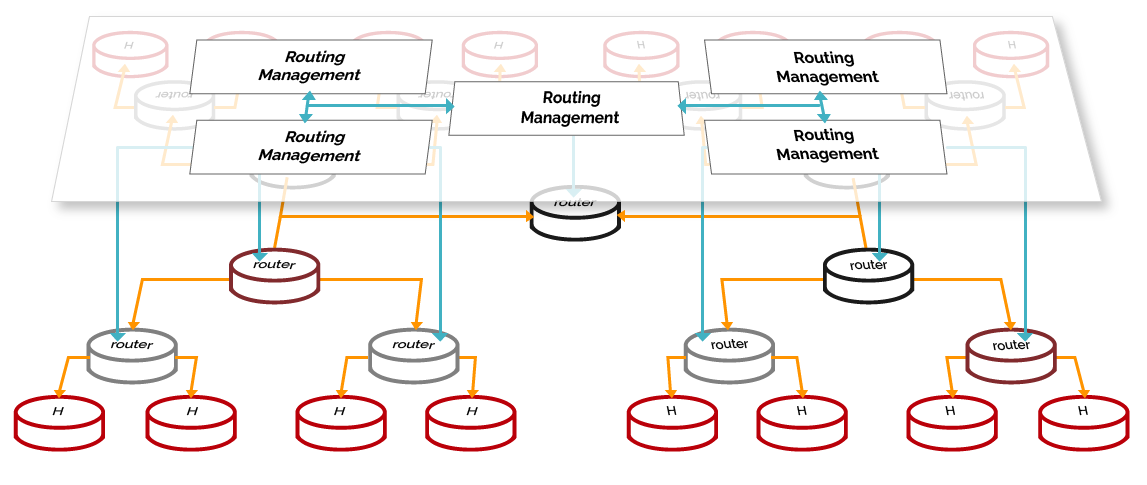Getting Started
- Quickstart
- How to use Hyperties in Applications
- How to develop new Hyperties
- How to develop new Protostubs
- How to develop new Idp Proxies
- Interworking Protostubs for Chat
- Interworking Protostubs for WebRTC
- How to develop Message Nodes
- reTHINK Core Framework implementation
Concepts
- Conceptual Foundations
- Hyper-linked Entities - Hyperties
- Decentralized Messaging
- Protocol on-the-fly
- P2P Data Synchronization
- Decentralized Trust
- Reference Architecture
- Communication Control Main Workflows
APIs
Messaging Framework
- Messaging Framework Overview
- Messaging Node
- Protostub specification
- P2P Message Delivery
- Message Node and Protostubs design recommendations
Runtime
Trust Management
How it Works - Basics
- Overview on reTHINK Basic Mechanisms
- Runtime Deployment
- Hyperty Deployment
- Protocol Stub Deployment
- Address Allocation
- Hyperty Registration
- Message Routing
- Routing Address Resolve for Msg Node Stubs
- Routing Address Resolve
- Intra-runtime Msg Delivery
- Inter-runtime Msg delivery
- Cross Domain Msg delivery
- P2P Msg delivery
How it Works - Data Synchronization
- P2P Data Sync Overview
- Data Object Creation
- Data Object Subscription
- Data Object Unsubscription
- Data Object Delete
- Data Object Child
- Data Sync Resume for Observers
- Data Sync Resume for Reporters
- Observer unsubscribed by Reporter
- Data Object Reporter Delegation
How it Works - Discovery
How it Works - Identity Management
- Identity Management Overview
- Identity Binding
- Id Token generation
- User identity assertion
- Domain Login
How it Works - Legacy Interworking
Testing
- Tests and Evaluation Overview
- Interoperability Evaluation
- Identity Management Evaluation
- Message Node Evaluation
Core Datamodel
Data Object Models
- Communication Data Object
- Connection Data Object
- Context Data Object
- Databackup Data Object
- Wallet Data Object
- E-commerce Data Object
- Spot Data Object
- Device Data Object
- Elearning Data Object
Messages Specification
- Messages Specification Overview
- Data Object Synchronization
- Address Allocation
- Registration
- Wallet management
- Discovery
- Identity Management
- P2P Connections Management
Backend Deployment
Standards
Use-Cases
- reTHINK Use Cases Overview
- H2H Conversation with single CSP
- H2H inter-domain Manageable Conversation
- H2H Conversation with decoupled CSP and IdP
- Always Connected with the Trusful Ones
- Dynamic Media Server or Media Gateway provisioning
- Trust
- H2H Conversation with QoS
- H2H Partial Anonymous Conversation
- H2H Multiparty Conversations
- H2H Conversation Browsing
- User Authentication and Registration
- Service Subscription
- M2M Seamless connected from different but Trustful domains
- Validation of trust
- M2M Always Connected in Trustful Domains for Multi vendor devices
- Human Context Presence Management
- Service Recommendation by Business Broker
Decentralized Messaging
Decentralized Messaging
Decentralised Communications are built on top of a Resource Oriented Messaging model that supports publish/subscribe as well as request/response messaging patterns. Messages are used to perform CRUD (Create, Read, Update, Delete) operations on resources handled by communication endpoints, for example to create or update a WebRTC connection.

The Message delivery is based on a network of routers where each router only knows adjacent registered routers or end-points. The routers forward messages to all registered listeners, which can be other routers or the final recipient end-point. Listeners are programmatically registered and unregistered by Routing Management functionalities, which take their decisions according to a higher level view of the Routing Network.

There are different layers of routers in the Decentralized Communication architecture. The lower layers are responsible for the communication between components on a single end-point. The upper layers - the Message Nodes - route messages between end-points in the same service provider domain or even between different domains. The Decentralized Messaging Framework is protocol agnostic, i.e. domains with different internal messaging protocols (e.g. SIP, Matrix) can exchange message with each other. This is achieved by Message Nodes supporting the Protocol on-the-fly concept.
